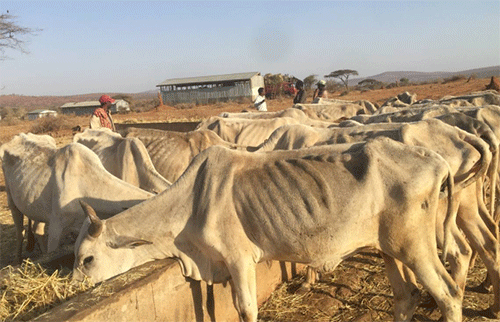Aletta Shikololo
Paulina Ndalikokule
President Nangolo Mbumba declared a state of emergency on 22 May 2024 as the country grapples high levels of drought and food insecurity, with over 300 000 households already registered to receive drought relief.
Last week, executive director in the Office of the Prime Minister I-Ben Nashandi said the government has budgeted N$825 million for the programme. New Era has spoken to various regional and constituency representatives as well as other stakeholders to shed light on the situation nationwide.
The Namibia National Farmers Union (NNFU) said farmers all over the country have started to move their cattle to other regions and areas in search of better grazing.
The union’s CEO Kuni Shamathe said although he could not provide specific information on the migration, it is an open secret that farmers are severely affected by this year’s drought.
In the past, farmers from the Omusati and Ohangwena regions flocked to the Uuvudhiya constituency in the Oshana region to feed their cattle. The Uuvudhiya and Okatyali constituencies are believed to have good grazing land and excess water.
Uuvudhiya councillor Timoteus Shivute told New Era that livestock farmers from other regions have already started to move to his constituency in search of grazing.
He said while their grazing situation is better than most, it could get worse if more farmers continue to migrate.
“At the moment, where there is water, there is no grass, and vice-versa. But it’s better than not having anything at all,” he added.
Oshana governor Elia Irimari said although they have not conducted an
official assessment yet, cattle from Omusati, Kunene, Ohangwena and some parts of the Oshana regions have started to flock to areas such as Uuvudhiya and Okatyali for better grazing.
The latest preliminary census figures show that Oshana has 230 801 people.
“We don’t have boundaries within the regions, and it is difficult to have control over the movement of animals. Some boundaries are also under traditional authorities,” he said.
Meanwhile, Ohangwena governor Sebastian Ndeitunga said farmers cannot migrate to his region because there is limited grazing.
“As far as I know, I didn’t receive reports of cattle moving around from other areas. But the situation is obvious that cattle owners move cattle in search of food. I don’t expect farmers to flock here because there is nothing,” the former police chief observed.
Ndeitunga said the whole Ohangwena region, with a population of 337 729, is affected by drought, and urged people to use their available resources sparingly.
“It is very serious. I can tell you that it is now in May and the grass is already almost done and finished in some areas, while mahangu fields are dry with no hope of harvesting,” he said.
He added that people buying mahangu from Angola for consumption should be allowed to bring their food across the border without paying extra fees.
“I don’t know what system should be used for them to determine who is buying for survival, and who is buying for selling. Maybe common sense should prevail,” Ndeitunga remarked.
He then urged councillors to continue monitoring the drought situation, and identify people in dire need as a matter of urgency.
“We should remain strong, tie our belts and survive like the Welwitschia plant that has lived in the desert for 200 years without water,” he said.
Only 16 000 out of 48 000 households recorded for drought relief have benefited in Ohangwena thus far, while in Oshana, 17 000 households managed to benefit.
We won’t survive
The Hardap region is one of the regions hardest-hit by drought. Governor Solomon he said the state of drought in his region is dire, and even the relief from the government might not be enough.
As the region is highly reliant on agriculture as the main economic activity, April said households are left scratching their heads due to low crop production and scarcity of water.
“We are barely surviving,” said the governor.
April added that households and animals are suffering, and suggested more assistance from external entities as that is the only way people will survive.
“I don’t know how, but it is not going to be possible for us to pull through if we don’t do more in terms of collective efforts to help people to survive. We need more than the government is giving. We need other players to come in and help us in order to survive the scourge,” he reiterated.
Hardap is home to over 106 000 people, according to the latest population statistics.
Sell off
Otjozondjupa farmers are hit hard, as the region is primarily dependent on livestock farming.
Speaking to New Era, governor James Uerikua said his region, with a population of 220 811, is facing a huge challenge due to below-average rainfall.
“That alone is setting us back. It is a serious challenge in terms of the regional outlook programme in terms of food security and
the agricultural sector itself,” noted the governor.
Uerikua said out of seven constituencies, there is not one area that is not hit by drought.
“Farmers have resorted to selling their livestock. However, the market doesn’t seem to be promising because the current situation is that the prices are low, and
most farmers are stuck between either selling their livestock for peanuts, or losing it to drought,” he continued.
Uerikua thus called on those involved in the livestock market to be lenient to farmers.
Asked about measures in place to tackle the scourge, he said they are making sure to activate the system to beresponsive.
At the moment, around 16 000 families in the region are fed on a monthly basis through drought relief food. On top of that, 5 800 households in the San communities continue to receive food aid through the Office of the Prime Minister.
“This is to ensure that no one dies of hunger. But crop production is at its lowest,” he said, especially for communal crop producers who rely on the rain.


